Galaxy teammates remember a very surprising David Beckham
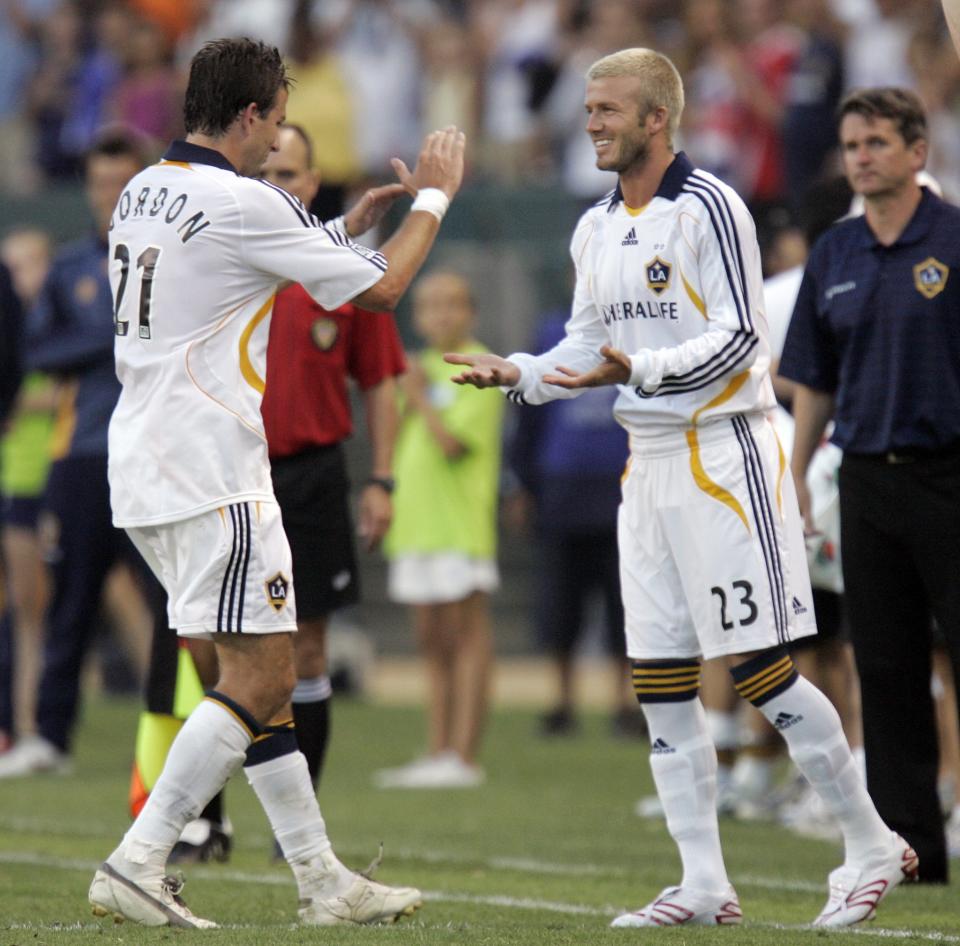
In 2007, David Beckham left Real Madrid, one of the biggest soccer clubs in the world, for a team that had been playing for just a decade, and on which some players made under $13,000 a year in a league that was still finding its feet. Major League Soccer would be changed forever, but so would Beckham’s teammates on that LA Galaxy team.
A few of them shared their memories.
Alan Gordon, a young striker trying to stick with the team: “A month before he got to the team, nobody cared about us. Nooooobody cared. We could walk around anywhere in Southern California and nobody would recognize you. Only the most die-hard Galaxy fans would and those were pretty few and far between back then. After David came everything changed. The Galaxy, all of a sudden, it meant something. And you were treated differently because you were on David Beckham’s team.”
Cobi Jones, veteran winger: “There was hope about what he could bring to the league and the Galaxy. And a little bit of fear about what that meant for the players – a player of his stature, is he going to try to come in and just try to dominate the organization? That made it a little bit of a stressful and unknown situation.”
[ FC Yahoo: How the Beckham signing changed American soccer ]
Kyle Martino, veteran midfielder: “It was kind of like winning ‘American Idol’ and going from bars where you’re a local hero to playing sold-out stadiums. It was an overnight thing. We had 15 people tops at practice from the media a week before the game, and there were like 200 people when he was there, with helicopters flying over the practice field.”
On his first day at the club, Beckham introduced himself to his teammates before practice.
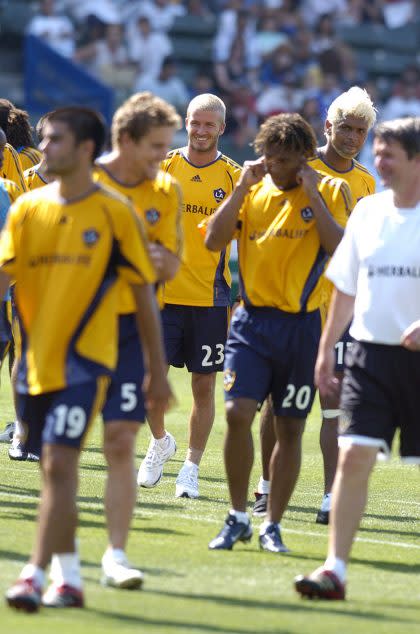
Martino: “He started at one end of the locker room and walked down, one-by-one, to introduce himself [to everybody]. And he’s in a real sharp suit – a suit probably that was half a year’s salary for some of the guys whose hand he was shaking – and he was the one who was nervous. He walked around and in a very quiet and humble way would just say, ‘David’ and everyone introduced themselves.”
Gordon: “I was very naïve to the level of fame that David had. I wasn’t really a student of the game back then. I didn’t really follow players in Europe. I knew who he was, but I didn’t really know much about him. I was kind of a jokester. I was about halfway down the line and there were a lot of people to meet. He just did his normal, very good-looking smile and it would be pretty ridiculous for him to introduce himself every time. So I just kind of grabbed onto his hand and said, ‘And you are?’ He laughed and everybody got a good laugh at it. It broke the tension.”
Martino: “I think David was grateful that he did that because it was such a tense, quiet moment when he was walking around the room like a dignitary. Everyone kind of exhaled and he quickly became one of the guys, as much as you can become when you lead around this circus that follows him.”
If Beckham worked hard at fitting into a club that was incomparable to Real, the team’s mostly Spartan circumstances nevertheless changed dramatically overnight.
Jones: “All of a sudden we had massive security going just to training sessions. We had to go through checkpoints just to get to the locker room.”
Martino: “The first road trip we were on, we stayed at the Braintree Marriot when we were playing New England. I remember seeing his face when we walked into that place. We were already talking about this before we walked through the door, because of what he was used to. He wouldn’t be the type of guy to ask for the biggest and best, but you can’t help when you’re used to a certain standard – of even amenities, like the ice machine working and getting a meal that doesn’t have burned marinara sauce – having your eyes opened about how different it was. That, the travel, the artificial surfaces – there were so many things that he really couldn’t believe were a part of Major League Soccer.”
Gordon: “I’m not sure that David fully had a grasp on the situation he was getting himself into. It was pretty bare-bones back then. We weren’t making a lot of money. He was playing with guys who weren’t even sure they were going to play two years pro. We liked to say MLS was kind of a college all-star league back then.
Martino: “There were a lot of quick changes, some of them necessary, because you can’t be sitting at the gate in the terminal for a Southwest flight with David Beckham. You just can’t do it. It’s like you’re traveling with a rhinoceros. People are looking over and coming up to him. There were a lot of logistical things because we were traveling with Mick Jagger.”
Chris Klein, veteran midfielder: “The attention that was brought on the team when we would travel I’ll never forget. When we flew to Korea and Hong Kong and Shanghai, I did an appearance with him at an Adidas store and for every way that you could see, the streets were mobbed with people just trying to get a look at David – I’d never in my life seen anything like that.”
Beckham simply lived a different life from his teammates. While some of them ate the cheapest food they could find and coached youth teams on the side just to get by, Beckham and his pop star wife Victoria palled around with Tom Cruise and Katie Holmes, and with Will and Jada Pinkett Smith. He cleared tens of millions of dollars per year, while some of the Galaxy players barely made the minimum wage.
Martino: “We would joke about it from time to time. Once, we calculated what he’d made while he was in the bathroom. We would have a laugh about it, but with him. One day, we were trying to explain to him and [Portuguese defender] Abel Xavier what one of the guys on the team made. And they kept thinking we were saying that was per month. And we had to go, ‘No, no, that’s in an entire year.’ ”
Jones: “There were jokes. He took his fair share and just kind of laughed it off. David Beckham wasn’t brought to the Galaxy just for his abilities on the pitch. I think any reasonable player understood that. He was brought to elevate the level of the league.”
Gordon: “David was earning every dollar he made. He was worth it, for sure. You can’t say that about everybody. The amount of butts he was putting into seats, and just changing the league by himself. He was creating an awareness for a league that had no respect.”
Yet in Beckham, the Galaxy found a laid back family man who was more casual than they had imagined.
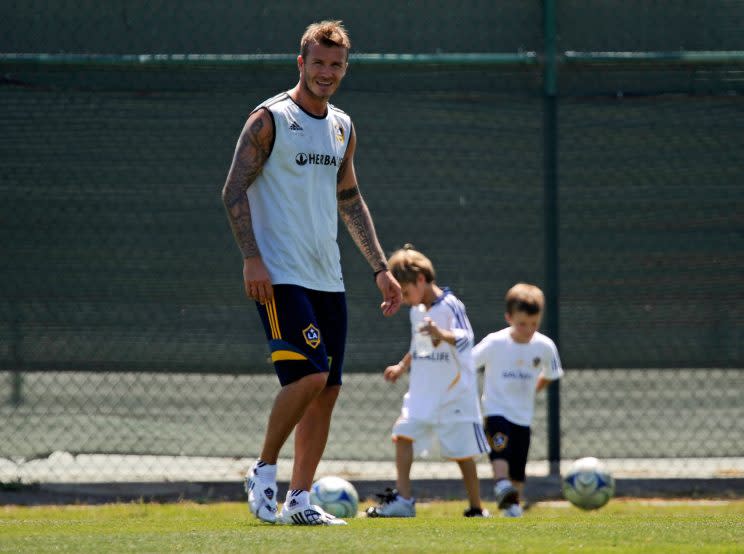
Jones: “David wanted to be part of the team. He wanted to fit into the locker room.”
Martino: “What made it so strange is here was this media machine following David Beckham around. But then he, juxtaposed to that, could not have craved normalcy more. A handful of us would always talk about what we wanted to do after games and grab something to eat or grab a drink. And more often than not David wanted to go to the hole-in-the-wall dive bar with a pool table in the back. That’s just the kind of guy he was. It’s where he’s most comfortable. He’s going to be recognized anywhere. And going to the hard-to-get-in A-list celebrity club, which we would do with him from time to time, was safer because there were other celebrities there to sort of mitigate the attention he would find and you could get roped off in a corner. But he seemed less comfortable in that environment.”
Gordon: “David tried really hard – he wanted to be one of the guys. He didn’t come in and act like a superstar around us, which is kind of impossible because you know how much money he has. But he really didn’t want it to be like that. He’s not throwing his money around. He was very generous to me, always taking me out to dinner, taking the team out for dinner. He was doing it in the right way without throwing it in our face. He wasn’t trying to make us feel less than him.”
Martino: “I think he envied us a little bit in how easy we could go about life in a relatively anonymous way. Of course every kid dreams of growing up to be David Beckham, but in a weird way he longed for the normalcy that we enjoyed, where we got to play the game at a professional level, but it wasn’t at the cost of being able to still be somewhat private citizens.”
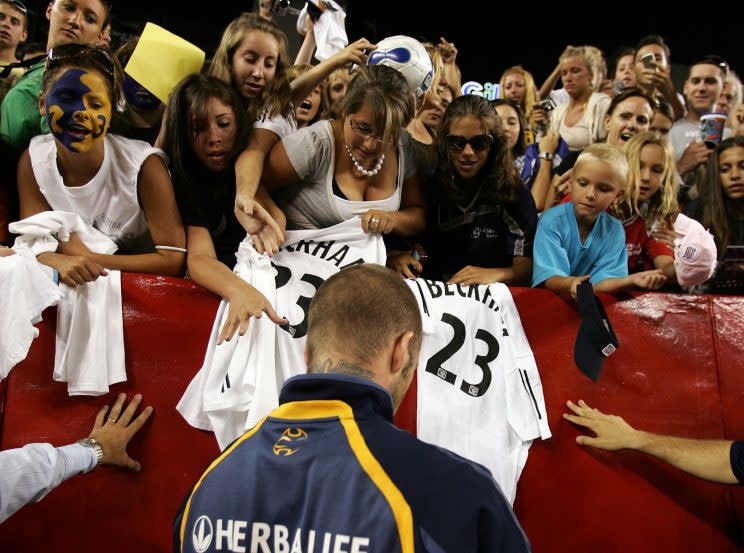
Beckham impressed his teammates with his unshakable patience and kindness to strangers in spite of the endless demands they put on him.
Klein: “David, as impressive as he was as a soccer player, and as genuine and as nice as he was – as he is – as a friend and as a man, the way that he dealt with the fans and the media was astonishing.”
Gordon: “He always took the time. No matter how many people lined up and what he was doing, he would always, always stop for autographs and make people feel like he cared. We’d get interrupted eating and he’d never say anything. He just went about it like it was normal.”
Big names who had arrived stateside before Beckham had been known to coast. But Beckham, still a member of the English national team, turned that stereotype on its head.
Pete Vagenas, veteran midfielder: “For me, in the end, the surrounding stuff was so much more incredible because he was someone who came to work every single day with his hardhat. It was an incredible dynamic.”
Gordon: “He trained every day and he played every time he could. He never took a day off. Even if he was flying in from London, that night he wanted to play. He would insist on it.”
Martino: “He would stay after practice to take free kicks. If anybody in the world didn’t have to work on his free kicks, it was David Beckham. He had an insatiable work rate. Just a relentless pursuit for perfection. When he got to us, his ankle was absolutely mangled. It was swollen, it looked awful. But he was the one who wanted to play every day, and needed to be saved from himself, needed to be told to stop.”
Don Garber, MLS Commissioner: “He had just a lot of competitive energy. David came to play. I could see it in his eyes when the Galaxy lost in [the 2007] SuperLiga [final] and I went to put a second-place medal over his neck. And he said, ‘You know, I want no medals for second place.’ He was so angry and so frustrated that they had lost.”
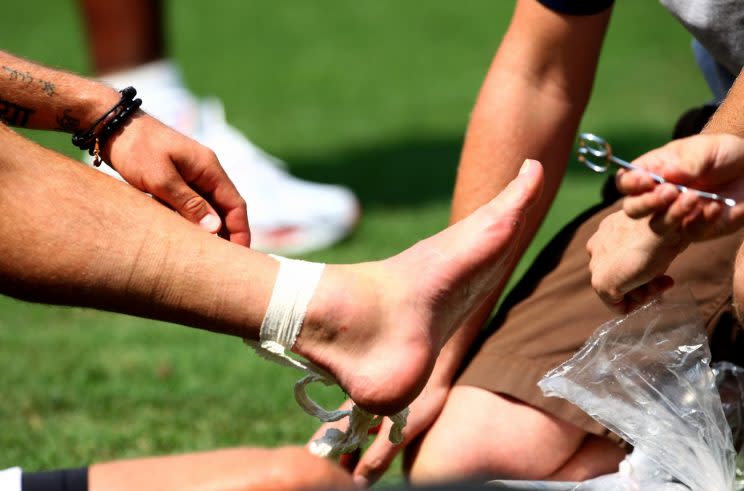
2007 proved to be a difficult season for the Galaxy, who finished 10 points out of a playoff spot. Beckham, after arriving midway through the season, played in just five games because of an ankle injury.
Alexi Lalas, Galaxy president and general manager: “The economics of it were working and the attention was there, and the marketing and all this kind of stuff. But we couldn’t get it right on the field. And that was a piece of the puzzle that was crucial, that you needed to have. That was frustrating; that was disappointing.”
Gordon: “There was always pressure. But now the world was watching and they expected David Beckham to be on a world powerhouse kind of team, and we just weren’t that. We just weren’t very successful. There’s always a lot of issues when you’re not winning. Things were very stressful. I remember Landon [Donovan, who had given up his captaincy to Beckham] and David were having their thing [friction over Beckham’s performance as captain], and that kind of split the team. [Head coach] Ruud [Gullit] didn’t have the best stint with the Galaxy, we weren’t being led properly. He was more worried about going out than actually set the lineup. There was just a lot of parts that were not clicking.”
Still, the 2007 season proved to be a memorable time for Beckham’s teammates.
Jones: “We’re getting coffee. We’re in the mall for about 30 minutes. And then one girl kind of recognized him as she goes up the escalator. She turns around and runs back down to him for an autograph. And literally from that moment, within a minute, there were probably 100 or 200 people around him. As soon as he was recognized, it was crazy. It was over.”
Vagenas: “What was surreal is the impact he had on others and the amount of recognition he garnered in public. That never went away, because there was always somebody who was seeing him for the first time. While his teammates became teammates and he became fairly mundane for the group, there was not a day that would go by that somebody new didn’t meet him and would have a big reaction to him.”
Martino: “It was interesting, in a kind of voyeuristic sense, to see what his life was like when you tagged along with him in public. But when I talk about staying at the Waldorf or flying in first class seats and VIP rooms, those things I don’t remember as much as I remember David duct-taping my locker shut and the next day I Krazy-Glued his flip-flops to the ground.”
Gordon: “I felt special. He gets treated a certain way. You’re this kid who has never experienced anything like this before. You’re just kind of along for the ride. To this day, if I say to people I play for the Galaxy, they’ll say, ‘Did you ever play with that one guy?’ ”
Leander Schaerlaeckens is a soccer columnist for Yahoo Sports. Follow him on Twitter @LeanderAlphabet.

 Yahoo Sport
Yahoo Sport 








































